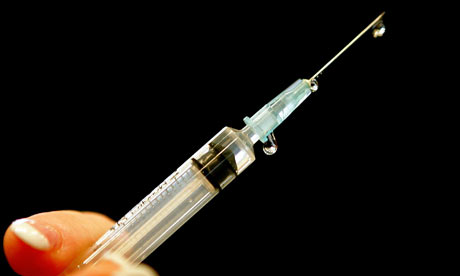
The UK's mass vaccination programme against swine flu was launched today, targeting 11 million priority patients and frontline health workers in its initial phase.
Amid fears that there would be a low take-up among NHS staff, the prime minister, Gordon Brown, told the Commons that the country was "ahead of the world" in its fight against the potentially fatal infection.
Doses of the drug Pandemrix are being offered in hospitals from today and supplies are being delivered to GPs' surgeries from the beginning of next week. Medical officials fear that a post office strike could delay letters being sent out to patients calling them in for immunisation.
The health secretary, Andy Burnham, was at University College Hospital in London for the first vaccinations. He said: "The people today who are volunteering are showing real leadership, they are sending a clear message out to people working in the health service that it is the right thing to do."
"We are one of the first countries in the world to launch a vaccination programme and we are looking ahead to a very difficult winter in the NHS, there is still seasonal flu around and we have the added challenge of H1N1 swine flu."
Sir Liam Donaldson, the chief medical officer for England, said: "This is the first pandemic for which we have had vaccine to protect people. I urge everyone in the priority groups to have the vaccine - it will help prevent people in clinical risk groups from getting swine flu and the complications that may arise from it. It's important for frontline health and social care workers to have the vaccine.
"It will help prevent them and their families getting the virus from patients, it will stop them passing the virus on to their patients, it will potentially protect them from mutated strains and it will reduce the disruption to NHS services caused by people being absent due to illness."
NHS staff have traditionally been reluctant to participate in mass immunisations. Only around 20% normally receive the seasonal flu vaccination. In a bid to overcome suspicions, professional health organisations urged their members to be innoculated.
A joint statement was issued by the British Medical Association, the Royal College of GPs, Royal College of Midwives, Royal College of Nursing, Royal College of Psychiatrists, Royal College of Obstetricians and Gynaecologists and Royal Pharmaceutical Society of Great Britain, as well as the union Unison which represnets many health workers.
It declared: "By the nature of their work, many NHS staff come into close contact with patients and the public and have a higher risk of exposure to the virus."
"The vaccine has been thoroughly tested. All NHS organisations will be working hard to ensure that eligible staff are given access to the vaccination to protect themselves, their families and their patients from swine flu. We encourage staff to protect themselves with the swine flu vaccine, in addition to the seasonal flu immunisation."
The UK death toll from the H1N1 virus has risen to 108 so far, with more than 70 people being treated in intensive care wards around the country. The age profile of those succumbing to serious infections is different to normal seasonal flu. As many as 370,000 people are estimated to have contracted the virus so far in the UK.
Victims of swine flu have tended to be far younger. Pregnant women are recognised as being particularly at risk; six of the UK deaths have been of women in the later stages of pregnancy.
In west Wales, a primary school was closed following high levels of staff sickness. Pontyberem community primary school in Carmarthenshire is due to reopen after the half-term holiday.
It is no longer routine policy to close schools if individuals catch the virus. At the last weekly briefing, the chief medical officer, Sir Liam Donaldson, revealed that almost 150 schools had recorded outbreaks.

